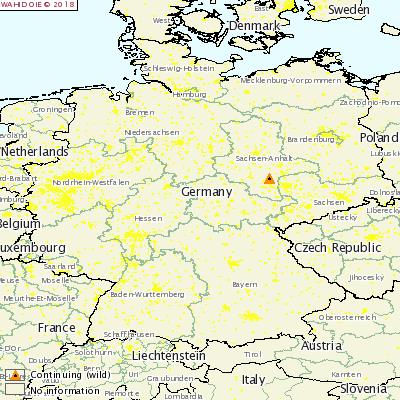West Nile Disease has arrived in Germany
On 30-08-2018, Dr. Karin Schwabenbauer, head of the veterinary office of the German Federal Ministry of Food and Agriculture (Bundesministerium für Ernährung und Landwirtschaft), notified the first two cases of West Nile Disease (WND) ever occurred in Germany. The Friedrich-Loeffler Institute (FLI) has ascertained by PCR the positivity to the West Nile Disease virus, in two Laptops of Lapland (Strix Nebulosa) found dead and belonging to the zoo of the city of Halle. The beginning of the disease has been set on 28-08-2018. WND is a disease caused by the West Nile virus (WNV), a virus belonging to the Flaviviridae family, isolated for the first time in 1937 in Uganda, in the West Nile district (from which it takes the name). The virus is widespread in Africa, western Asia, Europe, Australia and America. The disease is primarily affecting birds, horses and humans, but the virus has a wide host range. Birds are the reservoir and the amplifier of the infection, which is maintained through birds-mosquitoes transmission cycles. Mosquitoes after feeding on infected birds may transmit the virus to other birds and mammals, which, however, are considered dead-end hosts, due to the fact that, in most of these cases the virus does not reach a sufficient load in the blood to be transmitted to mosquitoes. Some birds are more susceptible than others, as in the case of those belonging to the Corvidae family. The disease cannot be transmitted directly from person to person or from animal to animal but only through the bite of the mosquito. The sole exceptions are represented by the transmission between humans through blood and organ donations, and the transmission between the mother and son through transplacental infection during pregnancy or during breast feeding. Most of the infected people show no symptoms. Among the symptomatic cases, about 20% have light symptoms: fever, headache, nausea, vomiting, swollen lymph nodes, skin rashes. Around 1% of infected people may have a more severe nervous symptomatology, but usually it occurs in subjects with immune system deficiencies or other chronic pathologies. In the most serious cases (about 1 over a thousand) the virus can cause lethal encephalitis. A vaccine for horses is available and in endemic areas it is advisable to vaccinate these animals. There is no vaccine for people or a specific therapy for the disease. The main preventive actions to be put in place consist in protecting oneself from mosquito bites with repellents and mosquito nets and avoiding to create the stagnation of water, such as in animal bowls and plant saucers. In Italy, the epidemiological surveillance of human cases of WND is regulated by the "Integrated National Surveillance and Response Plan for West Nile and Usutu - 2018 viruses" published by the Ministry of Health. In particular, this year, we have observed an increase of human cases in comparison to previous years. Further studies are currently under way.
More information at: https://westnile.izs.it
© IZSAM September 2018
|
|
Istituto Zooprofilattico Sperimentale
dell'Abruzzo e del Molise "G. Caporale"
Campo Boario | 64100 TERAMO | ITALIA
Telefono 0039.0861.3321 | Fax 0039.0861.332251
e-mail: archivioeprotocollo@izs.it
Posta elettronica certificata: protocollo@pec.izs.it
Partita IVA: 00060330677
Codice Fiscale: 80006470670



